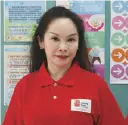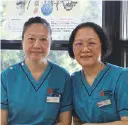To address Hong Kong’s aging population and the shortage of care workers, as well as to help care homes improve service quality, the government launched the "Special Scheme for Importing Care Workers" in June 2023. Under this scheme, while prioritizing employment for local workers, all elderly homes, homes for disabled persons, and nursing homes are allowed to import care workers with relaxed local-to-imported worker ratios and a streamlined application process. Sandy Macalister, CEO of the Helping Hand, expressed gratitude for the scheme, saying it has timely eased staff shortages and made home operations more efficient — calling it a “win-win” solution.
Helping Hand: A Win-Win Scheme

Sandy Macalister, CEO of the Helping Hand, expressed gratitude for the scheme, saying it has timely eased staff shortages and made home operations more efficient — calling it a “win-win” solution.
Mr Macalister emphasised people-centre people-centred elderly services depend heavily on recruiting and retaining quality staff.
Over the past decade, local recruitment has become increasingly difficult, as young people are reluctant to join the eldercare field. Staffing gaps were filled with retired care workers and temporary staff, which was not sustainable due to physical demands and high turnover undermining stable relationships with elderly residents.
Ms Kency Chan, Superintendent of the Helping Hand Father Sean Burke Care Home for the Elderly, explained local recruitment difficulties: care work requires shift work and overnight vigilance, which discourages youth who might prefer jobs like the catering industry; care work is also physically demanding. Despite challenges, local recruitment efforts continue with open invitations for interested locals to join.
Reliance on Temporary Workers and Importing Care Workers
Helping Hand's care home currently employs 19 imported care workers but still faces some vacancies filled by temporary staff.
Macalister noted the scheme fosters exchange between Hong Kong and Mainland eldercare. Imported care workers are adaptable, diligent, responsible, and eager to learn from local workers, benefiting elderly care quality locally and sharing knowledge back on the Mainland.

Preference is given to applicants fluent in Cantonese and with related Mainland care experience. Upon arrival, imported care workers receive training on differences between Hong Kong and Mainland care services to accelerate their adaptation (e.g., more detailed role distinctions in rehabilitation staff). Each imported care worker is paired one-on-one with a local care worker for mentorship.
Comprehensive Training and Support
Beyond job training, the home offers counseling and mentorship programs to help imported workers adjust culturally and socially. Interestingly, cultural differences have brought positive effects—for example, Mainland workers’ more open attitudes about end-of-life care have contributed useful insights.
The scheme allows subsidized and contract homes to import one care worker for every two full-time local employees, while private and self-financing homes can import one per local employee. By mid-2025, around 9,500 quotas have been approved in six rounds of applications. Ms Kency Chan, Superintendent of the Helping Hand Father Sean Burke Care Home for the Elderly praised the scheme’s role in alleviating manpower shortages and improving service quality. Elderly residents and their families view imported care workers positively, noting their enthusiasm and ease of interaction.
Local Care Workers Welcome Support
Local care workers at the Helping Hand Father Sean Burke Care Home for the Elderly also agree that the ‘Special Scheme’ helps them provide higher-quality care services to the elderly. Local care worker Li Huimei said, "The imported care workers have been a great help to us. Having stable staffing benefits both the staff and the elderly residents. Once the imported care workers have learned the work procedures, we feel confident entrusting residents’ care to them." She added that caring for the elderly is not just about feeding or bathing; each resident has different personalities and preferences, requiring different communication approaches. Having sufficient manpower gives care workers more time to pay attention to the individual needs of the elderly.
Another local care worker at the home, Lui Xuemei, remarked that the imported care workers are not only attentive to the elderly but also very humble and eager to learn. The home arranges for each imported care worker to be paired with a local care worker for guidance. "Every step is explained very clearly, and if they do not understand something, we explain it several times to help them absorb more. They also write down important points so they can review them later."
Imported care worker Tan Yumei, from Guangdong, shared that she has learned a lot about elderly care in Hong Kong. At first, she worried about keeping up with the fast pace of work but later realized, "It’s not as rushed as I imagined. The speed of care is secondary; safety always comes first." Another imported care worker, Li Boqiao from Guangxi, expressed deep appreciation for the range of support provided by the care home. "The arrangements here make me feel warm and at home. We have all everyday necessities, and the home assists us with opening bank accounts and shopping, allowing me to focus fully on my work at the home."

Local care workers at Helping Hand Father Sean Burke Care Home for the Elderly also recognize that the 'Special Scheme' helps them provide higher-quality care services to the elderly.
Voices of the Elderly: Attentive Care, Smooth Communication
Ms. Kwan Fuk-hing, 86 years old, has lived at the Helping Hand Father Sean Burke Care Home for the Elderly for 10 years and highly praises the imported care workers. She said, "They are very attentive and often take the initiative to chat about hometown culture, making me feel as close as family." Mr. Wu Kam-leung, 71, who has lived there for over 3 years, also appreciates the care workers’ attentiveness, adding, "They speak fluent Cantonese, so there is no communication barrier. Whenever I need something, I just call them. After they become familiar with the work, sometimes they will even bring me water without me asking."
Family Feedback: Confidence in the Quality of Care by Imported Care Workers
Mr. Hung, aged 76, was cared for at home solely by his then 78-year-old wife, Mrs. Hung, before he moved into the care home in 2020. Mrs. Hung recalled those times as very tough, saying, "At such an old age, I was taking care of him all alone. It was very hard, and I would lose my temper when exhausted." Her husband also lamented her hardship. After moving in, Mr. Hung’s transition to the home not only relieved Mrs. Hung’s burden but also brought joy to him. "At home, we could only prepare one dish per day because there was no time for anything else," he said, while the care home often changes the menu, providing different dishes daily. Mrs. Hung joked, "(My husband) looks healthier than I do." Regarding the introduction of imported care workers, Mrs. Hung remarked that since her husband’s daily needs require others’ assistance, "I’m certainly happy to have more staff taking care of him." She expressed confidence in the home’s good system that ensures the service standards of the imported care workers are met.
Another family member, Ms. Chung, also pointed out that whether care workers are local or imported, the most important thing is "respect for the elderly." She observed, "The imported care workers may have been slower at first, but once they got used to the work, it is basically impossible to differentiate between local and imported care workers."